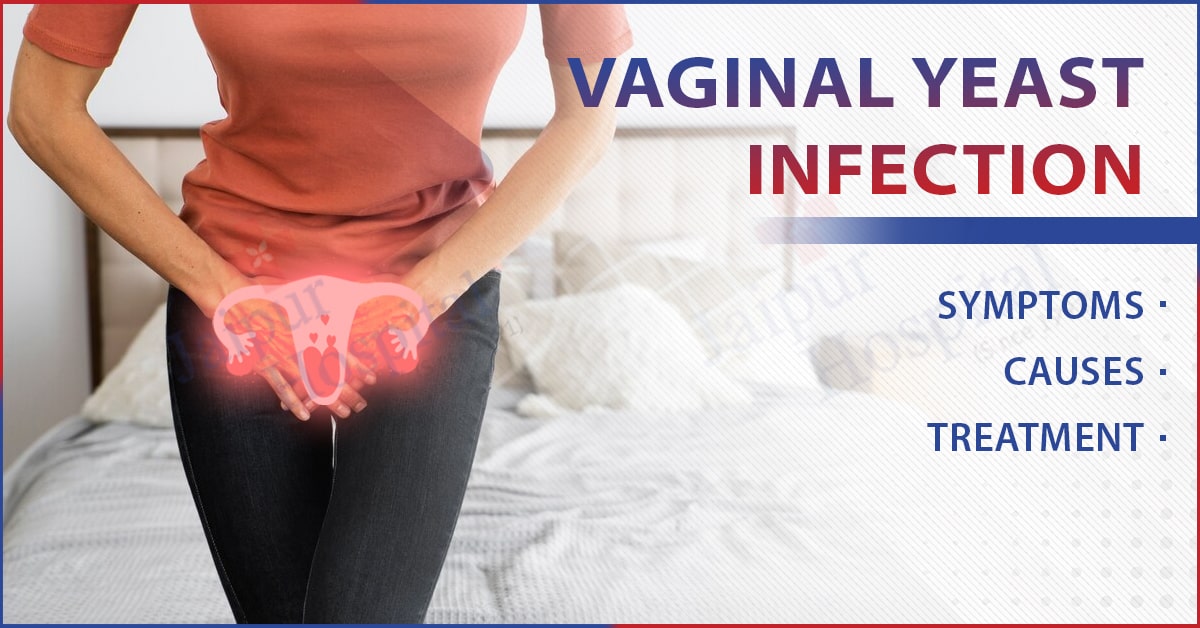Introduction
A yeast infection in the vagina also is known as candidiasis. This is an infectious disease that is attributed to excessive proliferation of Candida which grows naturally within the human body. This disease affects more than a million women and poses discomfort and irritation around their private areas. Proper diagnosis and prevention are essential and required for keeping the genital tract healthy. In this article, the following are discussed: how a vaginal yeast infection arises, its symptoms, cause, risk factors, prevention strategies, and available treatment options.
Read Also : Otitis Media (Middle Ear Infection): Symptoms, Causes, Diagnosis & Treatment
What Is a Vaginal Yeast Infection?
A vaginal yeast infection is a fungal infection characterized by an overgrowth of Candida yeast in the vagina. This leads to itching, burning, swelling, and abnormal vaginal discharge. Though Candida is usually a natural flora in the body, its excessive growth that may lead to infection could be caused by hormonal changes, weakening of the immunity system, and use of antibiotics.
Symptoms of Vaginal Yeast Infection
Vaginal yeast infections are the other common term of fungal infection that occurs in a female due to overgrowth of Candida yeast. Symptoms of Vaginal yeast infection include:
- Itching and irritation: It is the most prominent symptom of this condition. Itching usually happens around the vaginal opening, which might be accompanied by a small extent to the adjacent skin.
- Burning sensation: A feeling of discomfort or burning, especially during urination or sexual intercourse, is common.
- Unusual discharge: The discharge associated with a yeast infection is typically thick, white, and cottage cheese-like. It may not have a strong odor, but some people may notice a mild, yeasty smell.
- Redness and swelling: The skin around the vaginal area may appear red, inflamed, and swollen due to irritation.
- Pain or tenderness: There may be tenderness at the site, and overall, it might cause discomfort, especially while sitting or wearing tight clothes.
- Pain during intercourse: Sexual activity may be agonizing due to irritation and inflammation.
Causes of Vaginal Yeast Infection
It happens when the Candida yeast within the vagina becomes imbalanced to grow excessively. Some common causes include:
- Antibiotics: Antibiotics kill helpful bacteria that regulate yeast.
- Hormonal Changes: Pregnancy, menstruation, or hormone therapy can be a cause of hormonal change.
- Weakened Immunity: Diabetic patients, HIV/AIDS, and immune-suppressing medicines are some causes of weakened immunity.
- High Sugar Diet: A diet containing more sugar promotes yeast growth.
- Uncontrolled Diabetes: Yeast thrives well in high blood sugar levels.
- Tight Clothing: Fabrics that are non-breathable can trap moisture on the body, making it an ideal place for yeast growth.
- Hygiene Products: The use of perfumed soaps, sprays, and douches can irritate the vagina and its pH.
When to Seek Medical Help
While minor vaginal yeast infections can be treated with over-the-counter medications, medical attention is required in the following conditions:
- Severe Symptoms: Severe itching, burning, swelling, or severe pain.
- Recurrent Infections: If you have four or more infections within a year.
- Uncertain Diagnosis: If you are not sure whether your symptoms are caused by a yeast infection.
- Pregnancy: Before using any treatment, consult a healthcare provider.
- Pre-existing: Pre-existing Health Condition This includes patients with diabetes, HIV/AIDS, and weakened immune systems.
- Antifungal Infection: Lack of treatment response The symptom recurs or worsens with the use of antifungals.
Complications Associated with Vaginal Yeast Infections
While most vaginal yeast infections are mild and treatable, complications can occur if the infection is severe, recurrent, or left untreated. Common complications include:
- Recurrent Infections: If a woman experiences four or more yeast infections in a year, she has recurrent vulvovaginal candidiasis, which requires long-term management.
- Severe Infections: Symptoms such as widespread redness, swelling, sores, and intense itching may indicate a more severe infection that needs prescription treatment.
- Spread of Infection: In some instances, the disease spreads to other parts of the body, leading to systemic candidiasis, which may be a serious condition.
- Complications in Pregnancy: When not treated, infections occurring in pregnancy may lead to an increased risk of premature labor or passing the yeast infection to the baby when they are born.
- Weakened Immune System: A person with a weakened immune system is more likely to experience invasive infections that involve organs.
- Secondary Skin Infections: Constant scratching from itching leads to skin breakdown and, most often, a causative bacterial infection.
How to Diagnosis Vaginal Yeast Infection?
Diagnosing a vaginal yeast infection typically involves the following steps:
- Medical History: The healthcare provider will ask about your symptoms, medical history, and any previous yeast infections.
- Physical Examination: A pelvic exam is performed to check for signs of infection, including redness, swelling, and discharge.
- Sample Testing:
- Vaginal Swab: A sample of vaginal discharge is taken and examined under a microscope to identify the presence of Candida yeast.
- Lab Culture: For recurrent or severe infections, a lab culture might be performed to identify the type of yeast and its resistance to antifungal medication.
- Further Tests: For repeated infections, the doctor may prescribe some tests to identify whether it is due to any illness, such as diabetes or other immunological disorders.
Treatment for Vaginal Yeast Infection
Treatment for a vaginal yeast infection varies with the severity and occurrence. The most common remedies are:
- OTC Remedies:
- Antifungal creams, ointments, or suppositories: There are usually 1, 3, or 7-day treatments (such as
- clotrimazole or miconazole).
Vaginal tablets: Placed in the vagina to help stop the infection.
- Prescription medications
- Oral antifungal pills: For more severe infections, Diflucan, which is a pill version of fluconazole.
- Long-Term Treatment: An extended antifungal course may be recommended in patients who suffer from frequent infections.
- Self-Care and Lifestyle Remedies:
- Probiotics: Replaces the natural vaginal flora
- Yogurt or Probiotic Supplement: Enriched with Lactobacillus.
- Practice Good Hygiene and Healthy Habits
- Maintain hygiene of the vagina and keep it dry.
- Avoid using fragrant soaps, douches, and tight-wearing garments.
- Wear cotton-made undergarments that are breathable.
Prevention of Vaginal Yeast Infections
- Healthy Habits: Healthy habits can help prevent vaginal yeast infections. Some of the key prevention strategies include:
- Good Hygiene: Clean the vaginal area with warm water; do not use scented soaps and feminine hygiene sprays.
- Wear Breathable Clothing: Use cotton underwear and avoid tight-fitting clothes to reduce moisture buildup.
- Safe Antibiotic Use: Take antibiotics only when prescribed and as directed to avoid upsetting the vaginal flora.
- Control Blood Sugar: If you have diabetes, keep your blood sugar under control to prevent yeast overgrowth.
- Dry Yourself: Change out wet clothes, such as swimsuits and gym clothes, right away.
- Avoid Douching: Douching upsets the natural balance of vaginal bacteria, making it easier for infections to occur.
- Boost Immunity: Eat well, exercise regularly, and manage stress to keep your immune system healthy.
Conclusion
Vaginal yeast infections are a common but manageable condition that causes significant discomfort if not properly treated. It is important to know the causes, symptoms, risk factors, and treatment options for effective management and prevention. Many cases can be treated with over-the-counter medication, but recurrent or severe infections require professional medical attention. A vaginal yeast infection usually falls under the department of OB/GYN, which is usually concerned with women’s reproductive issues. Jaipur Hospital gives comprehensive services to deal with and take care of vaginal yeast infections for the best possible treatment, recovery, and prevention through a personalized and effective procedure.


